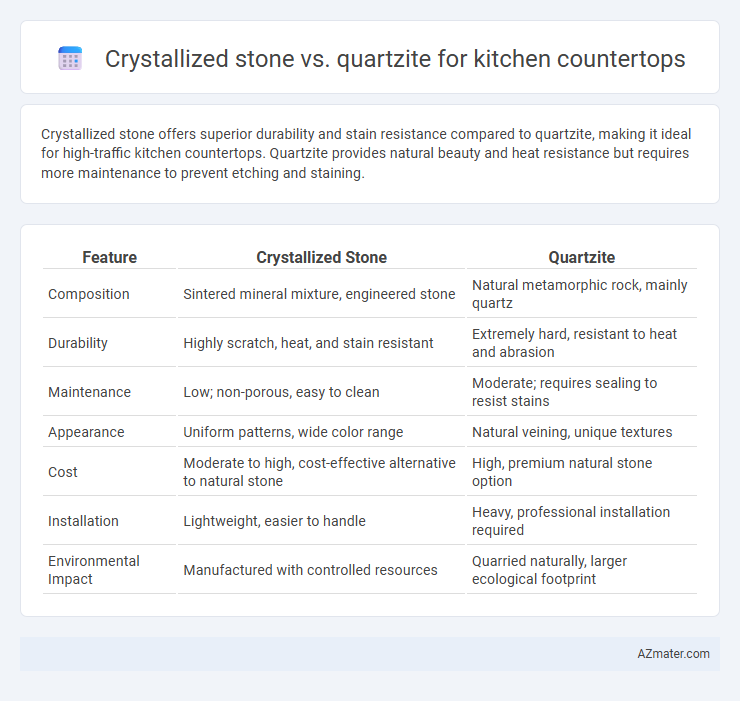Crystallized stone offers superior durability and stain resistance compared to quartzite, making it ideal for high-traffic kitchen countertops. Quartzite provides natural beauty and heat resistance but requires more maintenance to prevent etching and staining.
Table of Comparison
| Feature | Crystallized Stone | Quartzite |
|---|---|---|
| Composition | Sintered mineral mixture, engineered stone | Natural metamorphic rock, mainly quartz |
| Durability | Highly scratch, heat, and stain resistant | Extremely hard, resistant to heat and abrasion |
| Maintenance | Low; non-porous, easy to clean | Moderate; requires sealing to resist stains |
| Appearance | Uniform patterns, wide color range | Natural veining, unique textures |
| Cost | Moderate to high, cost-effective alternative to natural stone | High, premium natural stone option |
| Installation | Lightweight, easier to handle | Heavy, professional installation required |
| Environmental Impact | Manufactured with controlled resources | Quarried naturally, larger ecological footprint |
Introduction to Crystallized Stone and Quartzite Countertops
Crystallized stone countertops consist of engineered materials combining natural minerals with resin to create a highly durable, non-porous surface ideal for kitchens. Quartzite countertops are natural stone slabs formed from sandstone subjected to intense heat and pressure, offering exceptional hardness and a unique, organic appearance. Both materials provide distinct benefits in terms of scratch resistance, maintenance, and aesthetic appeal, making them popular choices for modern kitchen designs.
Composition and Formation: Crystallized Stone vs Quartzite
Crystallized stone is an engineered material composed primarily of natural quartz aggregates fused with resins and pigments under high heat and pressure, resulting in a dense, non-porous surface ideal for kitchen countertops. Quartzite is a natural metamorphic rock formed from sandstone subjected to intense heat and pressure within the Earth's crust, characterized by its high quartz content and natural veining patterns. While crystallized stone offers uniformity and enhanced durability due to its engineered composition, quartzite provides unique, natural aesthetics with exceptional hardness and heat resistance derived from its geological formation.
Visual Appearance and Aesthetic Differences
Crystallized stone countertops offer a uniform and polished surface with intricate, glass-like patterns that reflect light, enhancing kitchen brightness and modern appeal. Quartzite features natural, flowing veining and a slightly textured finish, providing an organic and timeless elegance ideal for classic or rustic kitchen designs. The visual difference lies in crystallized stone's sleek, consistent shimmer versus quartzite's more varied and natural stone texture.
Durability and Scratch Resistance Comparison
Quartzite offers superior durability and scratch resistance compared to crystallized stone, making it an ideal choice for high-traffic kitchen countertops. Its natural formation through heat and pressure results in a dense, hard surface that withstands daily wear, knife marks, and heat exposure effectively. Crystallized stone, while attractive and relatively strong, tends to be slightly softer and may require more maintenance to prevent scratches and chips over time.
Heat and Stain Resistance: Which Performs Better?
Quartzite offers superior heat resistance compared to crystallized stone, withstanding high temperatures without damage or discoloration, making it ideal for hot pots and pans in the kitchen. Crystallized stone, while durable, is generally more prone to heat damage and can develop stains if not sealed properly. Both materials exhibit strong stain resistance, but quartzite's natural density reduces the likelihood of staining, providing a more resilient surface for kitchen countertops.
Maintenance Requirements for Both Materials
Crystallized stone requires minimal maintenance, needing only regular cleaning with mild soap and water to maintain its polished surface and resistance to stains and scratches. Quartzite, while also durable, demands periodic sealing to prevent staining and protect against etching from acidic substances, making its upkeep slightly more involved than crystallized stone. Both materials are heat-resistant and hard-wearing, but quartzite's natural porosity necessitates more attentive maintenance to preserve its longevity in kitchen countertops.
Cost Comparison: Crystallized Stone vs Quartzite
Crystallized stone countertops typically cost between $70 and $150 per square foot, offering a more budget-friendly option compared to quartzite, which ranges from $85 to $200 per square foot due to its natural formation and durability. The manufacturing process of crystallized stone involves recycling natural minerals, contributing to its lower price point while maintaining aesthetic appeal resembling quartzite. Homeowners balancing cost and performance often lean toward crystallized stone for affordable elegance, whereas quartzite appeals to those investing in long-term resilience despite the higher upfront expense.
Installation Process and Considerations
Crystallized stone countertops require professional installation due to their heavyweight and precise cutting needs, involving advanced tools to ensure durability and seamless edges. Quartzite slabs also demand expert installers skilled in handling naturally occurring fissures and hardness to avoid cracking during cutting and fitting. Both materials necessitate thorough substrate preparation and precise measurements, with quartzite often requiring additional sealing to prevent staining, impacting the overall installation time and maintenance considerations.
Environmental Impact and Sustainability
Crystallized stone countertops are engineered from natural minerals and recycled materials, offering a low environmental footprint through reduced quarrying and waste production compared to natural stones. Quartzite, a natural metamorphic rock, requires extensive mining and processing that can lead to habitat disruption and higher carbon emissions. Choosing crystallized stone supports sustainability efforts by utilizing eco-friendly manufacturing processes and promoting resource conservation in kitchen countertop materials.
Which Is Best for Your Kitchen: Crystallized Stone or Quartzite?
Crystallized stone offers superior scratch and stain resistance, making it an ideal choice for high-traffic kitchen countertops that demand durability and low maintenance. Quartzite, a natural stone formed from sandstone and quartz, provides exceptional heat resistance and a unique, natural appearance that suits kitchens with a rustic or elegant aesthetic. Choosing between crystallized stone and quartzite depends on your kitchen's style preference, maintenance tolerance, and durability needs, with crystallized stone excelling in toughness and quartzite shining in natural beauty.

Infographic: Crystallized stone vs Quartzite for Kitchen Countertop
 azmater.com
azmater.com